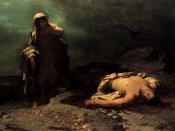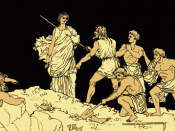"Antigone", written by Sophocles, is a typical Greek tragedy, complete with suicide, murder, and betrayal. There are definitely multiple themes to this incredibly famous play. However I believe the most pertinent theme is that the laws of God and the laws of man will always differ. However other relevant themes include the tyrannical treatment of women against men of power in Greek society and a slightly watered down but also applicable theme would be that sometimes lessons must be learned in the hardest manner.
The plot of the play is in a typically complicated tragic manner. King Creon has condemned Princess Antigone because she went against the king's decree and buried her brother Ploynices. Antgione now will be punished by starvation under King Creons decree. Antigone, however, is a passionate, strong willed and determined woman. We see her put the God's laws in front of the Kings laws because this she believes is how it's supposed to work.
An important ideal in Ancient Greece was the belief that the government was to have no control in matters concerning religious beliefs. In Antigone's eyes, Creon betrayed that ideal by not allowing her to properly bury her brother, Polynices. She believed that the burial was a religious ceremony, and that Creon did not have the right or power to deny Polynices. Antigone defies the decree of Creon and does what's right in her heart. As the old adage goes blood is thicker than water, she feels because it's her kin, it's her duty and honor to allow him to have his burial.
At first glance the impression that you get of Creon is that he's stern and acts in an ironclad manner. He's ethical and honest to the core however I believe that he is the one who...



Antigone is Great!!!
And your essay was alright.
1 out of 1 people found this comment useful.